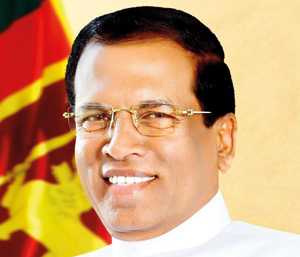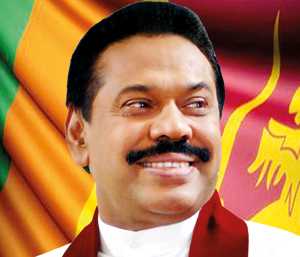Monday Feb 16, 2026
Monday Feb 16, 2026
Monday, 26 November 2018 00:00 - - {{hitsCtrl.values.hits}}
A month after Sri Lanka plunged into a Constitutional crisis following the surprise sacking of the sitting Prime Minister by the President, the country now has no clear Government, a Prime Minister, or any sign of breaking the deadlock between the Executive and the Legislature with democracy being the first casualty in the battle.
With the Executive President refusing to accept results of two no confidence motions passed in Parliament, 122 MPs who voted against the newly appointed Prime Minister and his Government filed a Quo Warranto petition challenging the Rajapaksa camp in the Court of Appeal on Friday, questioning the legitimacy of him holding Office.
 |
President Maithripala Sirisena |
 |
MP Mahinda Rajapaksa |
Earlier, 12 petitioners filed a Fundamental Rights application in the Supreme Court against the President’s decision to dissolve Parliament. The 19th Amendment – delivered on an election promise made by President Sirisena himself – restricted Executive’s power to dissolve Parliament.
The current crisis is unlike any seen before, says Lawyer Thishya Weragoda, who represented one petitioner in the cases filed against the decision to dissolve Parliament.
“Almost all previous issues have been single events. This issue at the moment is multifaceted. The removal of the PM, the purported appointment of a new PM, mala fide prorogation of Parliament so as to buy over MPs to artificially create a majority, purported dissolution of Parliament, all of these are complicating and deepening the constitutional crisis we are facing. There appears to be no endgame in mind for the President. He is digging deeper into the hole he has dug himself,” says Weragoda.
According to him, the decision to remove the sitting Prime Minister was not constitutional as it did not follow procedure which outlines provisions on when a sitting Premier ceases to hold Office.
“Sri Lanka was taken on a whirlwind trip just to please the whims and fancies of the President who was acting on some absolutely horrendous advice. The whole purpose of the 19A is to find comity and work towards the best interest of the country despite political differences. Sadly, the President seems to have not understood his role,” he explained.
The International community watching the situation has repeatedly called for the President to allow for constitutional process to take place and Parliament to decide on matters of the legislature. In a number of meetings held with both camps, the diplomatic community has urged both sides to follow due process.
Rajapaksa still remains a respected popular leader in the south, yet evokes strong negative feelings in the north and the east.
Drawing from the last phase of war and the post-war conduct of the Rajapaksas, the communities in the north are apprehensive about the situation developing in the capital Colombo.
Niyanthini Kadirgamar, a young activist working with the war-affected communities in the north, raised concerns on how this may impact the ongoing reconciliation efforts.
“It was not just the last months of the war. The post-war years under the Rajapaksas were polarising, too. Racially instigated attacks on the Muslims also led to a climate of fear for the minorities. The Tamils voted overwhelmingly to defeat the Rajapaksas in 2015, but they were disappointed yet again when the promise of constitutional reforms stalled and a path paved for the Rajapaksas to come back. This time with their own family party too – the SLPP,” she said. The Community worries about what may become of the Office of Missing Persons and the ongoing efforts to release their lands from the Army.
But the Rajapaksa camp is cautious this time; Keheliya Rambukwella, a strong Rajapaksa loyalist, has spoken positively about releasing land held by the Army – a move they strongly opposed when they were in the Opposition a month ago.
Amidst all the political crisis, Inspector General of Police Pujitha Jayasundara – under the President’s instructions, as recorded in the letters – ordered and then reversed a transfer of a key sleuth investigating into a number of high profile murder and assault cases with connections to the Rajapaksas, including the murder of Newspaper Editor Lasantha Wickrematunge.
The detective, Nishantha Silva, was the chief investigator in several major investigations into attacks on journalists during the tenure of the Rajapaksa administration, including the abduction and assault of national weekly newspaper Nation Deputy Editor Keith Noyahr, the assassination of Sunday Leader Editor Lasantha Wickrematunge, and assault on journalists Namal Perera, Poddala Jayantha, and Upali Tennakoon.
He is also the main officer on an abductions case of 11 youth by an alleged Navy abduction racket – a high profile case that has led to the courts issuing arrest warrants for Chief of Defence Staff Ravindra Wijegunaratne.
The transfer was seen as a bad omen of how the Sirisena-Rajapaksa camp will work in dealing with cases that are in the pipeline naming many of the Rajapaksa members as suspects. However, under pressure from civil society, the IGP later reversed the decision.